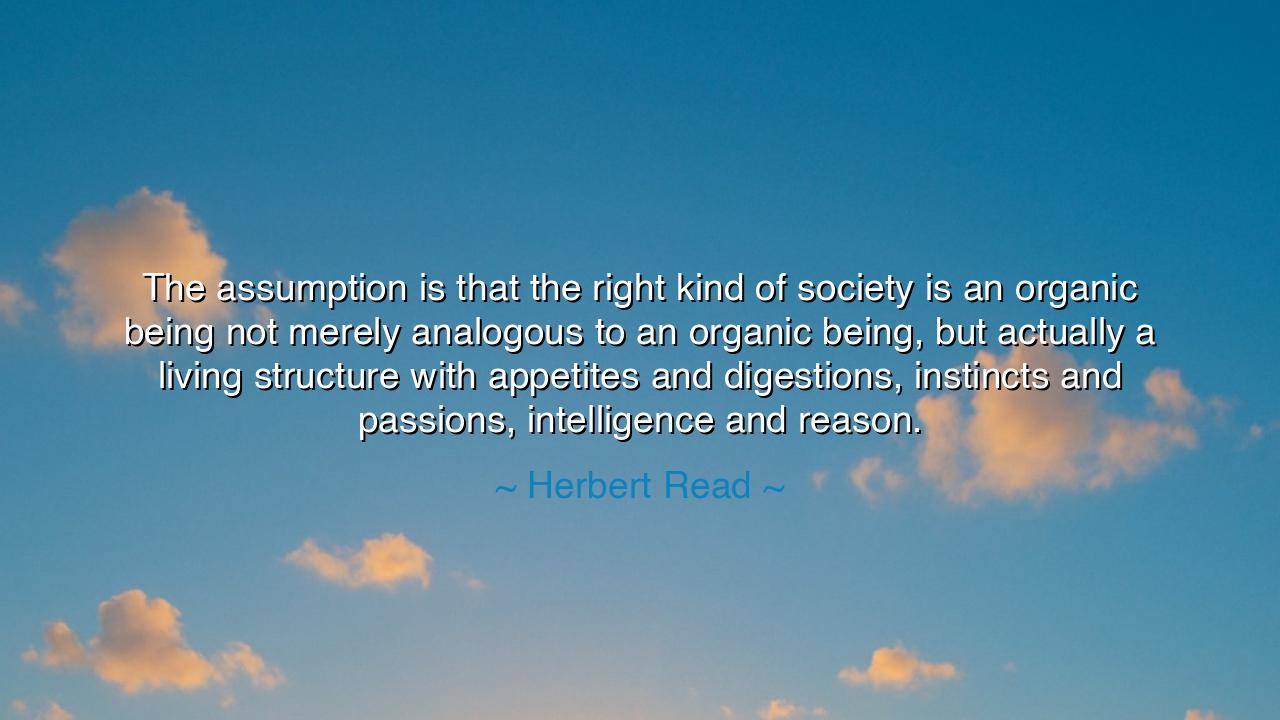
The assumption is that the right kind of society is an organic
The assumption is that the right kind of society is an organic being not merely analogous to an organic being, but actually a living structure with appetites and digestions, instincts and passions, intelligence and reason.






Here is a profound, ancient-style reflection on Herbert Read’s quote:
The Living Body of Society
When Herbert Read wrote, “The assumption is that the right kind of society is an organic being not merely analogous to an organic being, but actually a living structure with appetites and digestions, instincts and passions, intelligence and reason,” he did not speak as a mere philosopher — he spoke as one who saw civilization as a living creature, born of both mind and heart. His words remind us that a true society is not a machine built by hands, but a body nourished by spirit. It breathes, hungers, rejoices, and suffers as one — and in that shared life lies its beauty and its peril.
To call society an organic being is to understand that it cannot be reduced to laws and systems alone. Just as the human body is not only bone and sinew, but also pulse and soul, so too is a nation more than its institutions and monuments. It has appetites — the desires of its people. It has digestions — the way it consumes and transforms its resources. It has instincts that arise from ancient fears, passions that drive it to glory or ruin, and reason that must guide them all. When these elements live in harmony, the society thrives. But when one devours the others, the body sickens.
In the ancient world, this truth was known to the wise. The philosopher Plato spoke of the city as the soul writ large — where justice in the state mirrors justice in the heart of man. And in the far reaches of the East, sages compared the empire to the human form: the ruler as the head, the soldiers as the arms, the workers as the hands, and the scholars as the heart. The harmony of these parts, said the elders, was the key to peace. So too does Herbert Read remind us — the balance of passions and intellect, of instinct and reason, is the lifeblood of any people.
Consider the tale of the Roman Republic, which in its youth possessed vigor, discipline, and a sense of shared purpose. The heart of Rome beat strong because each citizen felt himself a part of a living whole. But as wealth grew and greed replaced virtue, the organs turned against one another — the Senate lost its wisdom, the legions their loyalty, the people their restraint. The body politic, once mighty, consumed itself from within. It was not enemies from without who destroyed Rome, but disease from within its own living structure.
Thus we learn: a society must be nurtured, not merely governed. Its instincts must be educated, its appetites moderated, its reason strengthened. To rule wisely is to heal and harmonize, not to dominate. Just as a healer tends to the body with care and patience, so must leaders and citizens tend to the life of their community. A cruel ruler is like poison in the blood; a corrupt merchant, like infection in the lungs; an indifferent people, like a heart grown weak.
And yet, there is also hope in Read’s vision. For if society is a living organism, then it can grow, heal, and renew itself. The wounds of war, the sickness of injustice, the fevers of greed — all can be overcome if the people remember they are bound by one breath. The life of one limb sustains the others; the suffering of one is felt by all. To ignore this is to court decay; to honor it is to create an enduring civilization.
Therefore, O listener, remember this ancient wisdom: You are not apart from society — you are a cell within its living form. When you act with kindness, you strengthen its heart. When you seek truth, you sharpen its mind. When you care for others, you cleanse its blood. Let no one believe that they stand outside the body of the world. Every action, however small, nourishes or wounds the whole.
So let us build not a machine of power, but a living structure of harmony, where reason governs passion, and compassion tempers strength. For only when we see society as alive — pulsing, breathing, sacred — will we treat it not as a thing to exploit, but as a being to love.






AAdministratorAdministrator
Welcome, honored guests. Please leave a comment, we will respond soon